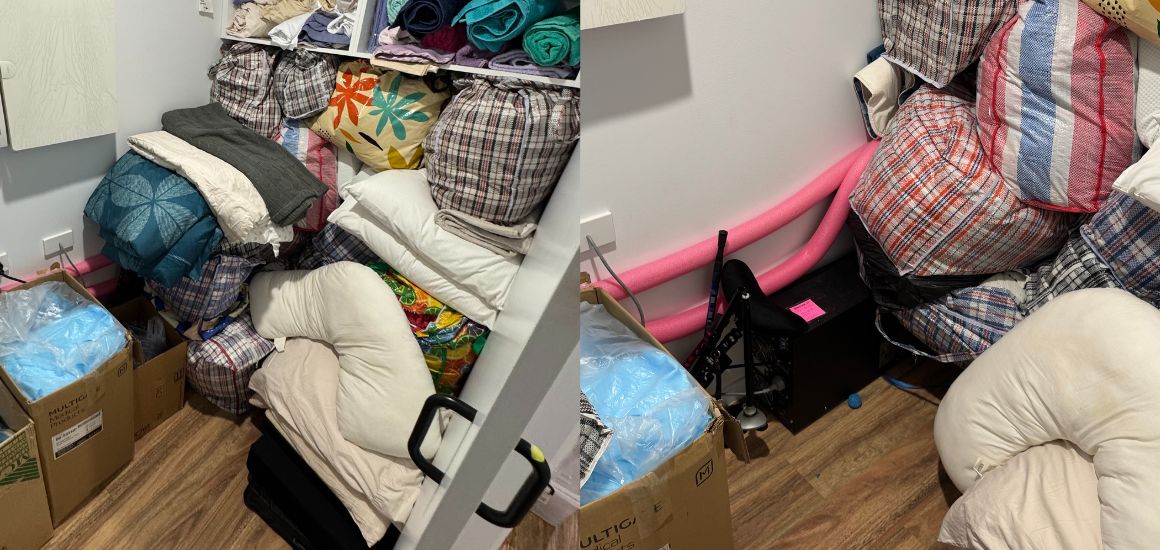Recently, one of our service personnel discovered this Uninterruptible Power Supply (UPS) in a Special Disability Accommodation house buried under plastic bags, cardboard boxes and clothing. It was the perfect combination of flammable products that closed off any ventilation to the UPS presenting a preventable fire risk. Worst case scenario, the house burns to the ground, or the UPS fails when it’s needed to provide emergency power.
Either way, it presents a life threatening and unacceptable risk to people who are already vulnerable.
We have grave concerns for the safety of Special Disability occupants when we see installations like this. UPS’s installed as a requirement of government legislation may either be life saving or life threatening if they are not installed correctly and maintained.
With the best of intentions, the NDIS Specialist Disability Accommodation Design Standard, calls for: “Emergency power solutions shall be provided to cater for a minimum 2-hour outage in no less than 2 double GPOs in participant bedrooms and any provided automated doors that are used for entry or egress.”
Page 71, Section 22.1 of the NDIS Specialist Disability Design Standard
Uninterruptible Power Supplies (UPS) are used to provide the battery backup. Often these UPS use additional battery banks to cater for the extended backup time required.
Where should the UPS be installed?
So where should the UPS be installed? A not so sensible place to park the UPS is near water and humidity. This rules out the bathroom, the laundry or the kitchen. Most opt for an out of the way well-ventilated cupboard or garage. That way the light hum of the cooling fan is closed off, allowing full clarity of the football team song after a win to be heard on the TV. Or the sound of silence after a loss.
No matter where the UPS is installed, consideration must be given to adequate ventilation and cleanliness. Poor air flow, heat, humidity and dust or other debris are the UPS’s worst enemy. In a properly ventilated, dust free, cool environment, the UPS can be expected to provide reliable service for a number of years, ensuring emergency power is available when its needed most.
In less favourable conditions the UPS can be less reliable and may not produce the expected back up time. It may even be life threatening!
Unfortunately, the life support systems that will be used in these accommodations are generally not known until after the occupant takes up residence, so the load that will be placed on the UPS is often only guessed at. If you need help to determine the right UPS for your application please reach out.
Calculating the Load
To properly calculate what UPS should be offered for installation on any site, we need to know what equipment will be connected to the UPS (the load) and the minimum number of minutes of backup time required. It is also very important to know where the UPS will be installed so we can consider which UPS technology will best suit the installation. Some UPS have fans that operate all the time where others only operate when the UPS is running on battery or when the battery is re-charging following a power outage.
Selecting the right UPS to suit the application is just the beginning. We urge all businesses selling UPS to remember they are not a set and forget item. Your customers need to be educated to know UPS’s should be checked periodically to ensure they are in good operating condition. Remember the batteries do require replacing from time to time. A UPS with failing batteries can never do the job it has been installed to do.
Service and Advice
If your customer’s UPS needs servicing please contact us or ask them to contact us. Our service division offers UPS preventative maintenance, UPS repair, UPS replacement and of course battery replacements.
Chase Power single and three phase UPS can also be found in airports, hospitals, mine sites, manufacturing plants, government buildings, ambulance stations, fire stations, banks, data centres and other critical infrastructure.
For trusted and experienced UPS advice, you know who to call.
Comments are closed.


